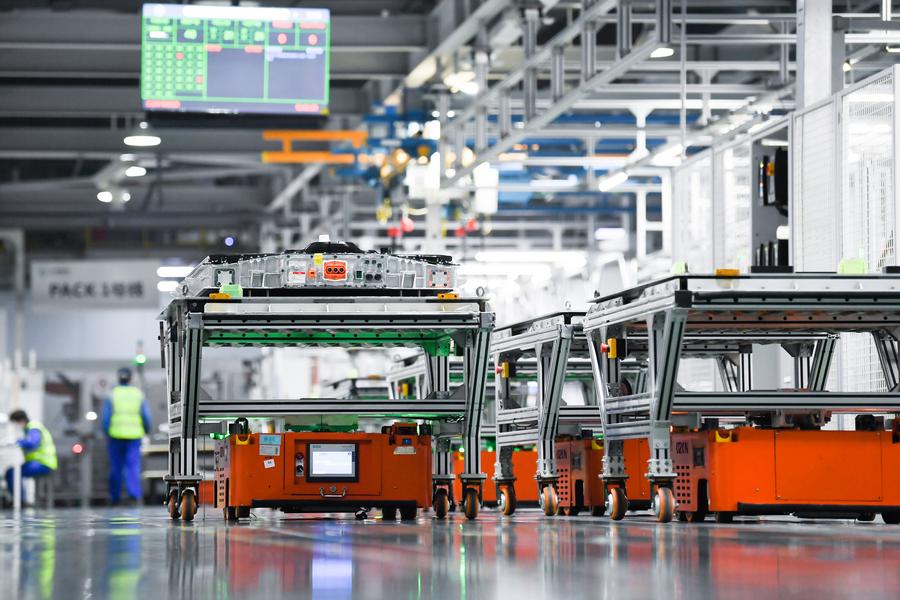Focus on developing new productive forces to have profound impact


In an era in which the race toward technological supremacy defines the contours of global economic competition, China's emphasis on the development of new quality productive forces marks a significant pivot in its quest for sustainable growth and technological innovation.
Participating in deliberations with fellow deputies from Jiangsu province's delegation to the 14th National People's Congress on March 5, President Xi Jinping stressed the need to foster new quality productive forces tailored to local conditions and to leverage new technologies to upgrade traditional industries.
The Government Work Report delivered by Premier Li Qiang to the second session of the 14th NPC listed speeding up development of new quality productive forces as one of the major government tasks.
This concept, which places a premium on high technology, efficiency and quality over traditional quantitative growth metrics, is not merely an economic strategy, but also a comprehensive vision that integrates advanced technological innovations with the principles of sustainable development.
As championed by President Xi, the development of new quality productive forces offers a glimpse into the future of economic growth and development — one characterized by technological advancement, sustainability and enhanced quality of life.
This vision, while ambitious, charts a course toward a more resilient and sustainable global economy, underscoring the need for continued innovation, collaboration and reform. This development will be profound, setting the stage for a new era of economic and technological cooperation.
The Government Work Report delivered by Premier Li represents a significant moment in China's economic policy direction, marking a lift of the Chinese economy to a more sustainable, innovation-driven future. The focus on new quality productive forces not only aims to enhance China's economic resilience and global competitiveness, but also contributes to the global agenda on sustainable development and technological innovation.
The implications of China's shift toward these new productive forces are profound and multifaceted. On the domestic front, it necessitates a series of systemic reforms — from policy innovation and educational reform to fostering an ecosystem conducive to research and development. These steps are essential for cultivating a new generation of technologies and industries that can drive high-quality economic growth and enhance China's global competitiveness in a rapidly evolving technological landscape.
Internationally, the move toward new quality productive forces is set to reshape the dynamics of global economic competition and cooperation. As China ascends the value chain, its role in global supply chains will undergo a significant transformation, necessitating adjustments from multinational corporations and economies worldwide.
However, this shift also offers new opportunities for international collaboration in tackling some of the most pressing global challenges, such as climate change and sustainable development, through shared technological innovations and solutions.
Moreover, China's focus on high technology, efficiency and quality underscores a broader recognition of the limitations of traditional growth models, which have often come at the expense of environmental sustainability and long-term economic resilience. By prioritizing the development of industries and technologies that align with these new productive forces, China is not only aiming to secure its technological sovereignty and economic vitality, but also contributing to the global pursuit of a more sustainable and resilient economic future.
As we look toward this future, the significance of China's strategic pivot cannot be overstated. It represents a bold reimagining of the pathways to economic growth and development in the 21st century, one that balances the imperatives of technological innovation with those of environmental stewardship and social well-being.
This strategic shift acknowledges the complex interdependencies of the modern world and highlights the importance of proactive adaptation and leadership in the face of emerging global challenges.
For the global community, engaging with and understanding this shift is crucial, not only in terms of navigating the evolving landscape of international trade and economic relations, but also in leveraging the potential of these new productive forces to address shared challenges and opportunities.
As China embarks on this transformative journey, the world watches closely. The success of this strategy will shape the future of China's economy and influence global economic patterns, technological development and environmental sustainability.
Engaging with China's new economic model offers the global community an opportunity to collaborate on shared challenges, driving collective progress toward a more sustainable and technologically advanced future. This collaborative spirit, fostered by mutual respect and shared goals, could pave the way for a new era of global economic cooperation, underscoring the importance of adaptability, innovation and partnership in the 21st century.
The author is editor-in-chief at Daily Ittehad Media Group and Pakistan Economic Net, and vice-president and chairman of the Foreign Relations Committee of the Council of Pakistan Newspaper Editors.

































